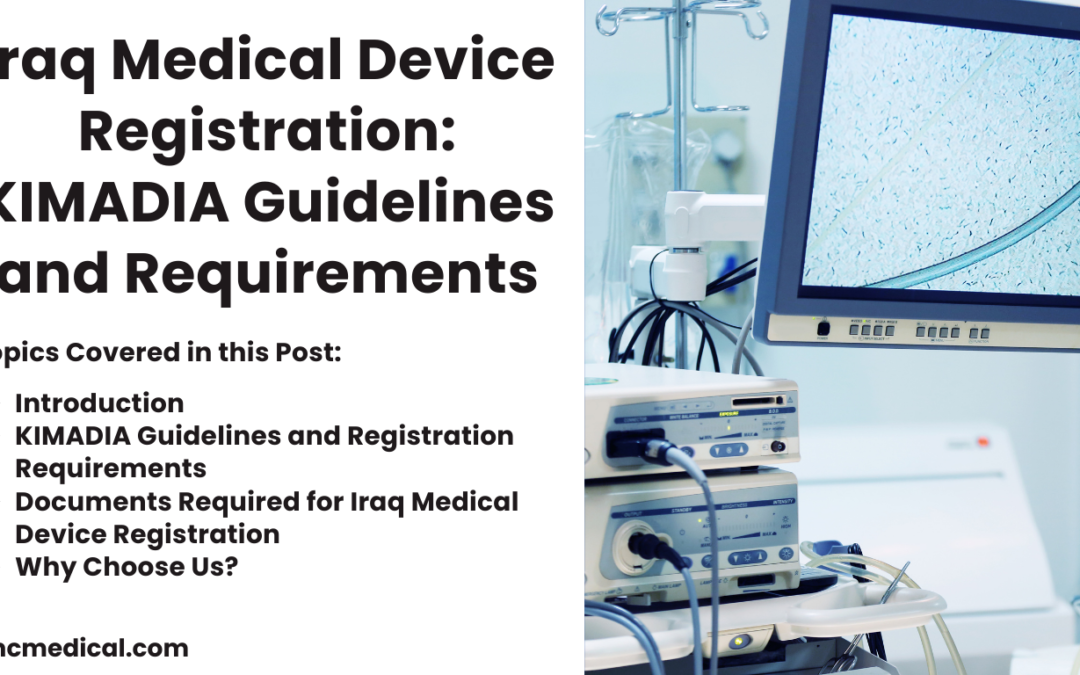
by OMC Medical | Apr 4, 2024 | Registration
Navigating Medical Device Registration with Iraq’s Regulatory Authority: KIMADIA Guidelines and Requirements
Regulatory Authority: State Company for Marketing Drugs and Medical Appliances (KIMADIA)
“Kimadia” refers to the Iraqi State Company for Marketing Drugs and Medical Appliances. It is a governmental organization responsible for procuring and distributing pharmaceuticals and medical supplies within Iraq, including through tenders and procurement processes.
When “Kimadia” issues tenders for medical devices, they may require that legal manufacturers and manufacturing sites be registered through a country-specific form. This registration process ensures that the manufacturers and manufacturing sites comply with Iraqi regulations and standards for medical devices.
Ministry Of Health: Iraqi Ministry of Health
Classification: Class A, B, C, D
KIMADIA Guidelines and Registration Requirements
- Registration of the foreign supplier at the Ministry of Health (MOH) Registration Board.
- For each consignment to the private sector, documents must be presented before an import license will be issued by the MOH.
- For sales under The State Company for Marketing Drugs and Medical Appliances (KIMADIA) tenders, a complete set of documents must be presented before an import license will be issued by the MOH.
Documents Required for Iraq Medical Device Registration
- Company registration form to be filled in one copy Signed and stamped by the person responsible on the establishment.
- Quality assurance certificate such as ISO 9001, 9002 or equivalent.
- Manufacturer registration certificate in the country of origin officially legalized.
- Spread data sheet of the company products (catalogue)
- Certification letter regarding the boycott with Israel.
- Company registration fee $ 1000.
- Manufacturer registration certificate in the C.O.O, and the LoA.
- Certificates of Free Sale (CFSs) are required for: general medical devices; active implantable medical devices and in vitro diagnostic medical devices as well as a mixture of the above devices.
License Validity
Registrations need to be renewed after five years, in most cases.
Additional Comments
- All submitted documents need to be properly legalised and stamped, as per Iraqi law.
- For products originating from certain countries, and in certain cases, the Ministry of Health will require the applying party to pay for Ministry inspectors to visit and inspect production facilities.
- Separate import licenses are needed for each shipment, obtained through the MOH.
- For tenders through KIMADIA, a specific registration process might apply.
Who should make this Communication?
- Manufacturer
- Authorized Representative
When to make this communication?
Before placing a medical device into the market.
How OMC Medical can assist you with the process?
- Act as your Authorized representative
Why Choose Us ?
- Working towards client satisfaction
- Cost effective solutions
- Project completion before deadline
- Quality Regulatory affairs solutions
Contact us for free consultation: [email protected]
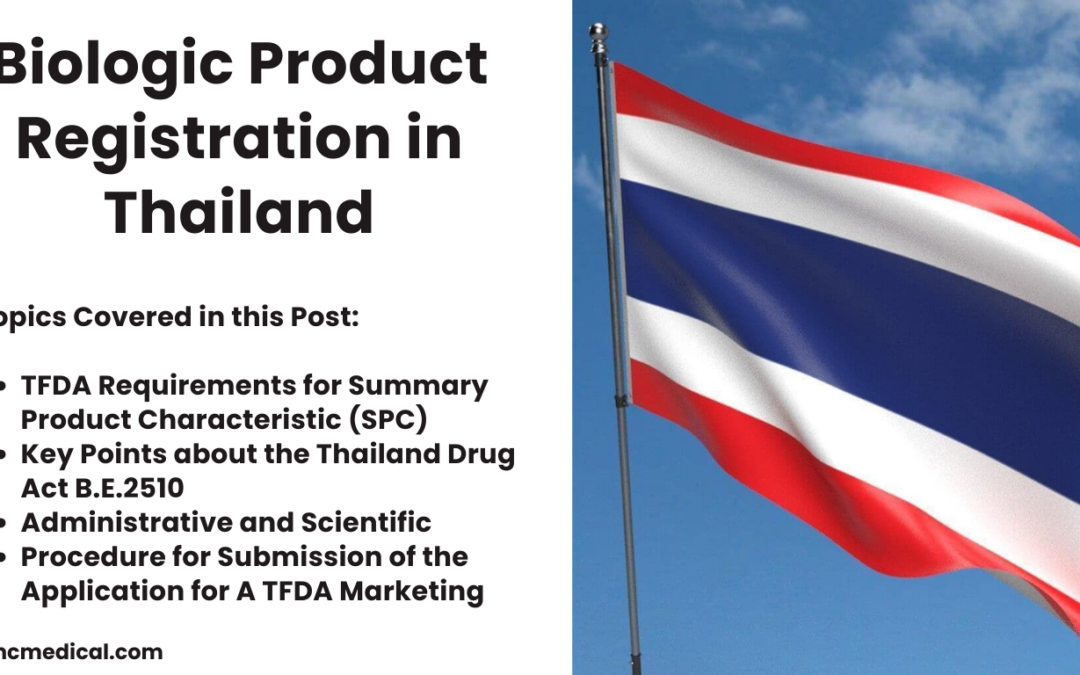
by OMC Medical | Jan 29, 2024 | Registration
Posology and method of administration
Special warnings and precautions for use
Interaction with other medical products and forms of interaction
Pregnancy and lactation If are pregnant, think may be pregnant or are planning to have a baby or are breastfeeding, ask doctor before taking the vaccine.
Effects on the ability to drive and use machines
Pharmacodynamic properties
Pharmacokinetic properties
Special precautions for storage
Nature and contents of container
Special precautions for disposal and other handling
Bio Similarity studies (In Biosimilar)
Marketing Authorisation Holder
Marketing Authorisation Number(s)
Date Of First Authorisation/Renewal of the Authorisation
Date Of Revision of the Text
Thailand, governed by the Drug Act B.E.2510. The key points are as follows
1. Legal Basis and Scope
Article 79 of the Drug Act mandates that no drug can be manufactured or imported into Thailand without obtaining marketing authorization from the Thai Food and Drug Administration (TFDA).
Articles 80, 81, and 82 of the Drug Act specify the application dossier requirements, including quality, non-clinical, and clinical information following the ASEAN Common Technical Documents (ACTD) or ICHCTD standards.
2. Application Particulars
The marketing authorization application must include details such as trade name, formulation, pack size, analytical method, label, product leaflet, and other documents as outlined in the Ministerial Regulation.
3. Variation Approval
Any variation to a marketing authorization requires prior approval from TFDA.
4. Procedural Mechanism
The procedures for marketing authorization applications, variation requests, and the issuance of credential certificates align with Ministerial Regulation No.18 (B.E.2525) under the Drug Act B.E. 2510.
5. Role of Drug Committee
Article 10 (1) of the Drug Act assigns the Drug Committee the duty to provide advice or justification for permitting the manufacturing, sale, or import of drugs into Thailand, including their marketing authorization.
6. Focus on Vaccines
The guideline specifically addresses procedural aspects related to the marketing authorization of vaccines.
A vaccine is defined as an immunogen intended to stimulate the immune system for disease prevention, amelioration, or therapy. It may take various forms, including live attenuated preparations, inactivated whole organisms, recombinant DNA-derived immunogens, and more.
Administrative and Scientific
Administrative and scientific advice is available at various stages of the drug development process. It can be sought during initial development, before submitting a marketing authorization application, or in the post-opinion phase.
4 Procedure for Submission of the Application for A TFDA Marketing Authorization Decision
Before submitting an application for marketing authorization to the TFDA, applicants can request a pre-submission meeting. This meeting allows discussions on procedural, regulatory, or legal issues related to the proposed submission.
To request such a meeting, applicants need to use the “Pre-Submission Meeting Request Form.”
1. Before Submission
At least six months prior to submission of an application for Marketing Authorization decision, applicants should notify the TFDA of their intention to submit an application and give a realistic estimate of the month of submission.
In that notification applicants should include:
- a draft SPC;
- an indication on the number of strengths / pharmaceutical forms / pack sizes (if already known);
- if applicable, their intention to present any existing Vaccine Antigen Master File (VAMF) or Plasma Master File (PMF) Certificates
- the details of proposed manufacturing sites for the finished product and active substances
- a specification of any regulatory issues or difficulties already identified which may require clarification or detailed consideration
2. Submission of the Application
The applicant shall submit the application at the One Stop Service Center (OSSC), TFDA a temporary permit number is issued to the applicant, and verification is completed within 30 calendar days.
3. Dossier to be Submitted
Supporting documents must be submitted in electronic Common Technical Document (eCTD) or other electronic submission platforms as appropriate. If the applicant wishes to use the VAMF or PMF certificate included in the application, the applicant must provide a valid certificate of conformity with the VAMF or PMF in accordance with the EMEA Directive 2003/63/EC Part III and the accompanying assessment report must be provided.
Use relevant VAMF and PMR data. In the case of vaccines containing or consisting of genetically modified organisms (GMOs), the request must be accompanied by documentation from the competent authorities for the intentional release of GMOs into the environment.
In addition, the applicant must provide evidence of the establishment of the applicant and future marketing license holder in the Kingdom of Thailand, as well as documents showing the ability and commitment to perform all the responsibilities required of the marketing license holder, in particular:
• a document identifying the person for pharmacovigilance who will be the contact person for any specific pharmacovigilance issues, together with a curriculum vitae and contact details
• a document identifying the contact person responsible for any quality issues including its contact details
4. Validation by the TFDA
During verification, the TFDA PTL may determine the need for actions related to items such as GMP testing, samples for analysis, GCP testing, communication with environmental authorities, and data integrity.
If TFDA needs additional data, information, or clarification to complete document approval, it will contact the applicant and request to provide such data, information, or clarification within a specified deadline.
4.1. Positive outcome of the validation
If the result is positive, the TFDA has 60 days the applicant must notify in writing that the verification has been completed. Ask external TFDA experts to send 4-7 copies of the document to TFDA PTL.
Applicants must also enter additional data. Information provided during the verification of supporting documents. The evaluation plan adopted by TFDA will be attached to the letter. Confirm positive validation results. Individual arrangements must create a PTL for the copies have.
4.2. Negative outcome of the validation
In the event of a negative validation outcome, where the requested data, information, or clarifications are not provided, the applicant will receive written notification.
If the application cannot undergo validation, the applicant will be given the option to either retrieve the dossier or authorize its destruction by the TFDA. Initiating a new procedure becomes necessary if the applicant plans to submit a complete dossier to the TFDA in the future.
4.3. Management of applications
Data Entry into Tracking System: Once validated, product details are recorded in the TFDA tracking system using a numbering system that provides clear identification throughout the product’s life cycle, including applications for marketing authorization, variations, and transfers.
Identification of Vaccine Applications: Applications for TFDA marketing authorization of vaccines can be identified by the invented name or, if available, the international non-proprietary name (INN)/common name of the active substance(s) combined with the applicant’s name.
For administrative purposes, each application is assigned a core number, consisting of four sections: 1A9000X/year, 2A9000X/year, 1B9000X/year, 2B9000X/year, 1C9000X/year, 2C9000X/year. Here, 1 represents one active substance, 2 represents more than one active substance, A stands for manufacture, B for repack, and C for import.
4.4. Need for samples and sample analysis
No Initial Sample Requirement: Applicants are not required to submit samples of the proposed vaccine at the time of application submission.
TFDA Request for Sample Testing: TFDA encourages applicants to submit vaccine samples promptly for testing at the Division of Biological, Department of Medical Sciences. This early submission helps ensure timely testing.
Test Protocol Specification: The National Control Laboratory (NCL) at the Institute of Biological, Department of Medical Sciences, in collaboration with TFDA, will outline a test protocol.
This protocol includes details such as sample types, sample quantity, batch numbers, specified tests, and the methods and specifications to be used.
Reporting Test Results: Upon completion, the test results are reported to the TFDA Product Team Leader (PTL). These results play a crucial role in the finalization of the TFDA Assessment Report.
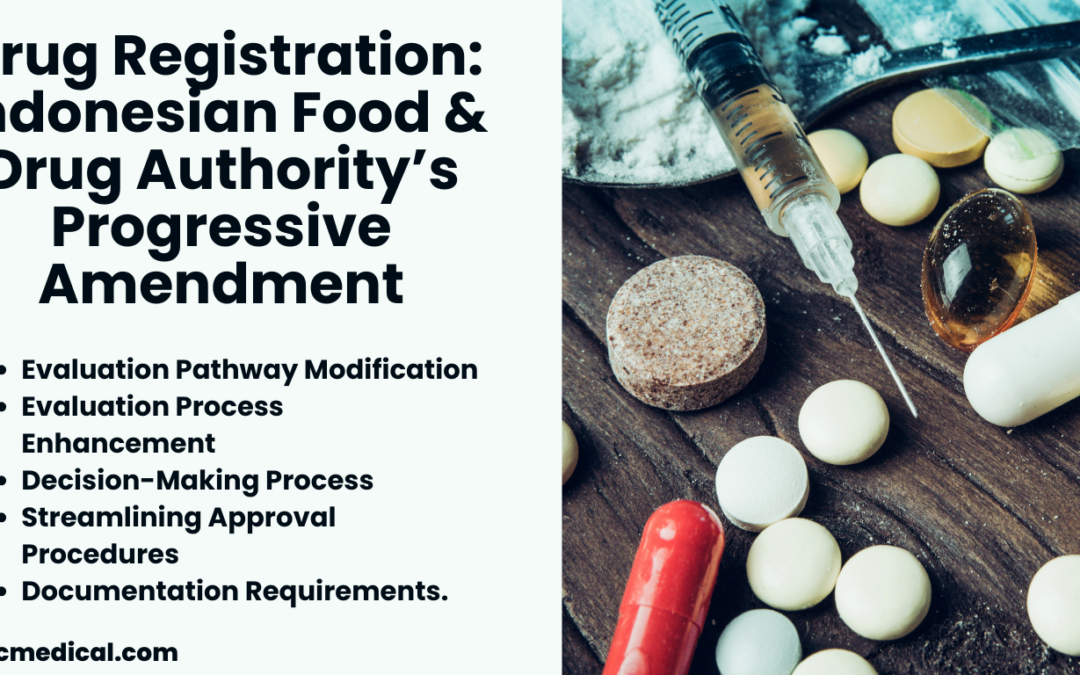
by OMC Medical | Jan 19, 2024 | Registration
Drug Registration – The Indonesian Food and Drug Authority (BPOM) plays a crucial role in ensuring the safety and efficacy of pharmaceuticals within the Republic of Indonesia. In 2019, the BPOM made a significant stride towards enhancing public services and aligning regulations with the evolving landscape of medicine.
Regulation Number 15 of 2019 amended the existing Regulation Number 24 of 2017, specifically focusing on the criteria and procedures for drug registration.
This amendment reflects a response to the changing legal needs and advancements in science and technology within the pharmaceutical sector.
Background and Objectives
The amendment, guided by the considerations outlined in the regulation, aims to accelerate public services by streamlining drug registration processes.
The provisions related to the drug evaluation pathway and the approvable letter, as specified in the previous regulation, were deemed outdated and incongruent with the current state of legal requirements and scientific advancements in the field of medicine.
Legal Framework
The amended regulation takes into account various legal documents, including Law Number 36 of 2009 on Health, Presidential Regulation Number 80 of 2017 on the Indonesian Food and Drug Authority, and Regulation Number 26 of 2017 on the Organization and Work Procedures of the Indonesian Food and Drug Authority.
These legal foundations provide the framework for the BPOM to exercise its authority and fulfill its mandate.
Top 5 Key Amendments for Drug Registration
1. Evaluation Pathway Modification
One of the significant changes introduced by Regulation Number 15 of 2019 is the restructuring of the evaluation pathway for drug registration. The amendment categorizes the evaluation process into different timeframes based on the nature of the drug and its intended use.
Notable pathways include a seven-day pathway for export-specific registrations, a 40-day pathway for minor variations, and extended pathways for critical drugs and new developments.
2. Evaluation Process Enhancement
The amendment also focuses on refining the evaluation process. Article 45 now mandates a comprehensive evaluation of efficacy and safety data, guided by scientific evidence and safety efficacy assessment guidelines.
The National Committee for Drug Evaluation plays a pivotal role in reviewing evaluation results and providing recommendations to the Head of the Agency.
3. Decision-Making Process
Article 49 has been revised to emphasize that the decision to approve or reject a drug registration application is based on evaluation results, recommendations, and local examinations at the drug manufacturing facility.
The decision, communicated to the Registrant, reflects a commitment to maintaining rigorous standards and ensuring compliance with administrative requirements.
4. Streamlining Approval Procedures
Article 51 introduces clarity in the approval process, specifying that marketing authorization, approval for special export, or approval for variation registration will be issued in writing to the Registrant.
Notably, drugs not yet produced on a commercial scale may receive an approvable letter, facilitating the preparation for commercial-scale manufacturing.
5. Documentation Requirements
The completeness of pre-registration documents is detailed in the annex, outlining administrative, quality, nonclinical, and clinical document requirements.
The stringent criteria for reference countries, patent-related documentation, and the role of the Directorate General of Intellectual Property in patent searches underscore the commitment to thorough scrutiny.
Effective Date and Implementation
Regulation Number 15 of 2019 came into effect on July 17, 2019, under the leadership of the Chairperson of the Indonesian Food and Drug Authority, Penny K. Lukito. The regulatory changes were subsequently promulgated on July 18, 2019, emphasizing transparency and ensuring public awareness of the modifications.
The amendment to Regulation Number 24 of 2017 marks a progressive step by the Indonesian Food and Drug Authority in aligning its regulations with contemporary legal needs and technological advancements.
By streamlining evaluation processes, enhancing decision-making criteria, and specifying documentation requirements, the BPOM demonstrates its commitment to ensuring the safety, efficacy, and timely availability of pharmaceuticals for the Indonesian public.
As the pharmaceutical landscape continues to evolve, such regulatory adjustments are crucial to maintaining a robust and responsive healthcare system.
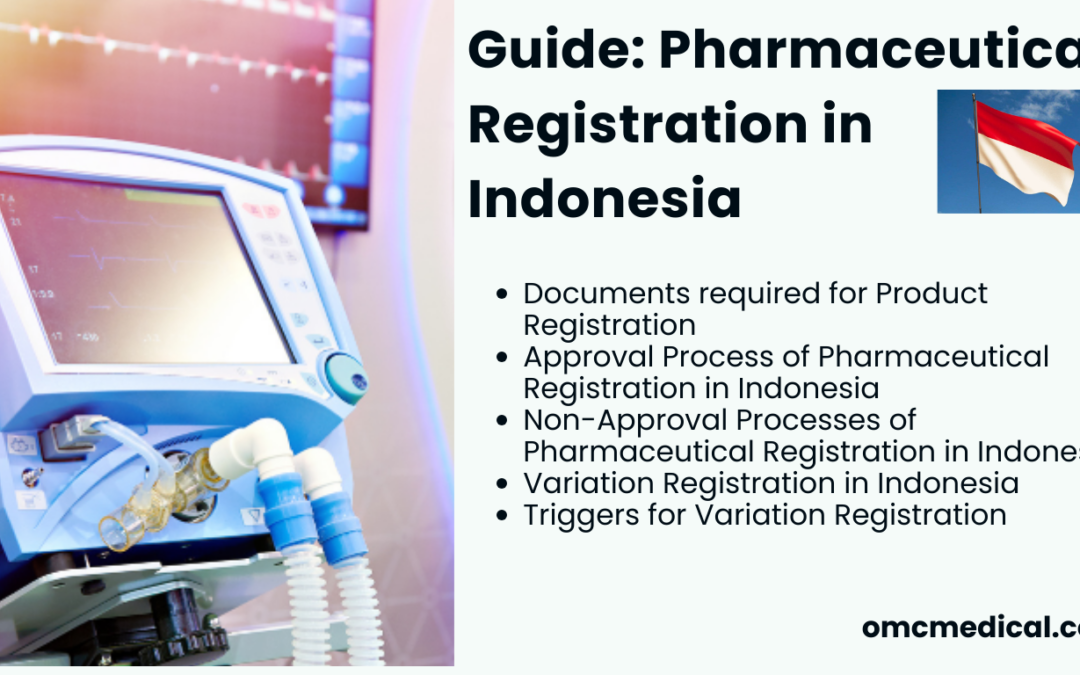
by OMC Medical | Jan 18, 2024 | Registration
Territory: Southeast Asia
Official Language: Indonesian/English
Regulatory Authority Name: Badan Pengawas Obat dan Makanan (BPOM)
Regulatory Authority website: https://www.pom.go.id/
Mail ID: [email protected]
Regulation Name: Government Regulation No. 74 of 1996 on Pharmaceutical Affairs
Local Authorised Representative: Yes
Classification: New Drug, Generic Drug, Biologic, Biosimilar.
Registration Timeline: 3 to 12 months
License Validity: 5 Years
Registration fees: IDR 100,000 to IDR 30 million
Commodities under the control of BPOM:
Pharmaceutical • Foods • Biologicals • Traditional Medicines • Health Supplement • Cosmetics • Hazardous Substances
Documents required for Product Registration
A. Administrative Documents
- Cover letter.
- Certificates and administrative documents as per Annex VI.
- Documents for determining the 100 Days pathway:
- Justification for serious and rare diseases (Orphan Drug) and/or
- Justification for the treatment of serious life-threatening diseases, easily transmitted diseases, or lack of safe and effective treatment options and/or
- Supporting documents for public health programs.
Documents for determining the 120 Days pathway
- Information on Marketing Authorization status from another country with evidence.
- Full Assessment Report (AR) in English from the reference country authority with proposed indications and posology like the reference country.
Registration conditions with the reference country
- Criteria for selecting a reference country (EU, US, Australia, Canada, UK, Japan).
- Ensure identical aspects related to drug quality.
- Declaration letter confirming the similarity of Drug Master File (DMF) submitted to the Indonesian FDA to that of the reference country.
- Drug approval in the reference country within the last 5 years.
Documents for determining the 300 Days pathway
- For new registration or major variations with new indications/posology not covered in the 100- and 120-Days pathways.
Drug documents related to patents (if necessary)
- Patent-related declaration letter.
- Results of patent searches from the Directorate General of Intellectual Property.
- Results of patent self-assessment.
B. Quality Documents
Quality overall summary
- Information on animal-derived ingredients used in the manufacturing process.
- Drug Master File (DMF) or equivalent document for Active Pharmaceutical Ingredients (APIs) not used in approved drugs in Indonesia.
C. Non-Clinical Documents (if necessary)
- Non-clinical overview.
- Non-clinical tabulated summary.
D. Clinical Documents (if necessary)
- Clinical overview.
- Tabulated study synopses.
Approval Process of Pharmaceutical Registration in Indonesia
- The head of the NA-DFC is responsible for issuing decisions on approval/disapproval of marketing licenses.
- In some cases, NA-DFC may request additional data to determine approval/denial of a product. In this case, the applicant must provide this requested information within 120 days.
- If the applicant does not provide the information within the deadline, the application will be rejected.
- However, applicants have the option to submit their documents as a new application for drug registration in Indonesia.
Non-Approval Processes of Pharmaceutical Registration in Indonesia
- In instances where the National Agency of Drug and Food Control (NA-DFC) reviews an application and decides to disapprove the product, the applicant has the option to file a non-approval appeal.
- The applicant is permitted to submit a written appeal within six months from the date of the application rejection. The appeal should be accompanied by additional product data aimed at providing stronger justification for the approval of the product.
- It is important to note that applicants are limited to a maximum of two appeals in this process.
Variation Registration in Indonesia
- Purpose: To update the registration of a drug that has already been granted market authorization but has undergone modifications.
Triggers for Variation Registration
- Changes in license-holder
- Trade name
- Manufacturing site or factory name
- Importer
- Inactive ingredient
- Excipient
- Specification
- Method of analysis
- Packaging or labelling
Types of Variation Registration (Categories)
Category 4 (VaMa)
- Major changes with significant impact on efficacy, safety, or quality.
- Requires full registration process.
Category 5 (VaMi-B)
- Minor changes that still require approval.
- Does not fall under VaMi-A or VaMa.
Category 6 (VaMi-A)
- Minor changes with minimal or no impact on efficacy, safety, or quality.
- Only requires notification to BPOM (no approval needed).
Re-Registration (Category 7)
- Separate process for renewal or extension of the marketing authorization period.
Key Points
- The appropriate category of Variation Registration depends on the extent of change and its potential impact.
- VaMa requires the most extensive process, while VaMi-A is the most streamlined.
- Re-Registration is distinct from Variation Registration and focuses on extending the marketing authorization timeframe.
The evaluation pathway for drug registration in Indonesia
7 Days Pathway:
- Registration for Export-Only Drug.
10 Days Pathway:
40 Days Pathway:
- Minor Variation Registration.
50 Days Pathway:
- First registration of Investigational New Drugs by the Pharmaceutical Industry investing in Indonesia.
75 Days Pathway:
- First registration of the First Generic Drugs by the pharmaceutical industry investing in Indonesia.
- Variation Registration of New Drugs and Biological Products related to quality, approved in at least 1 country with an established evaluation system.
100 Days Pathway:
- New Registration of New Drugs and Biological Products indicated for the treatment of serious diseases threatening human life (lifesaving), easily transmitted diseases, or lack of other safe and effective therapeutic options.
- New Registration of New Drugs and Biological Products based on justification for serious and rare diseases (Orphan Drug) in Indonesia.
- New Registration of New Drugs, Biological Products, Generic Drugs, and Branded Generic Drugs for national health programs with supporting documents or WHO prequalification.
- First Registration of New Drugs and Biological Products by the pharmaceutical industry investing in Indonesia.
- New Registration of New Drugs and Biological Products developed through Investigational New Drugs in Indonesia with at least 1 clinical trial conducted in Indonesia.
- New Registration of Generic Drugs having the same specifications as Branded Generic Drugs or vice versa.
- Major Variation Registration with new indications/posology for Drugs.
120 Days Pathway:
- New Registration of New Drugs and Major Variation Registration with new indications/posology approved in at least 1 country with an established evaluation system.
150 Days Pathway:
- New Registration of Generic Drugs and Branded Generic Drugs not covered in the 100 Days pathway.
300 Days Pathway:
- New Registration of New Drugs and Biological Products.
- Major Variations Registration with new indications/posology not covered in the 50- and 75-Days pathways.
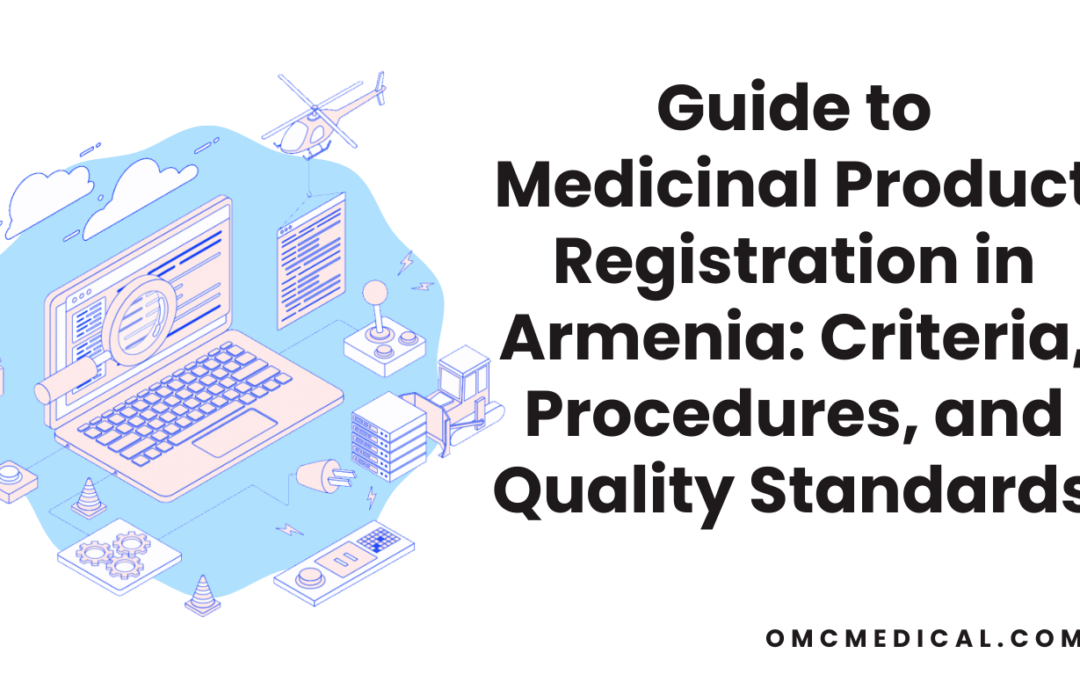
by OMC Medical | Jan 16, 2024 | Registration
MoH: Armenia Ministry of Health
MoH website: https://www.gov.am/en/structure/1/
Regulatory Authority: Scientific centre of drug and medical technology expertise
Link for Regulatory Authority: https://www.pharm.am/index.php/en/
Overview
The registration of medicinal products in the Republic of Armenia involves adherence to a set of stringent requirements outlined in various legislative acts. The fundamental legal framework comprises the Laws of the Republic of Armenia, specifically the “On Medicinal products” and “On State Taxes” statutes.
Additionally, the Government of the Republic of Armenia has issued Decree No347 of 25 April, 2001, titled “On adopting the Rule of Registration of Medicinal products and Assessment Fees for Registration of Medicinal products in the Republic of Armenia.”
Over time, this regulatory landscape has undergone modifications, as evidenced by amendments introduced through Government Decrees No148-N (3 February, 2005), No1000-N (3 September, 2009), No266-N (10 March, 2011), and No122-N (14 February, 2013).
Further intricacies are addressed in the Decree No1603-N of 25 November, 2010, which focuses on “Rules of Good Manufacturing Practice for Medicinal products,” and the subsequent Decree No1089-N of 26 September, 2013, concerning “Rules of Good Manufacturing Practice Compliance Inspection and Certification of the Medicinal products and APIs in the Republic of Armenia.”
Complementary to these, the Ministry of Health plays a pivotal role, as outlined in the Order No123-N dated 7 February, 2006, which approves “The Procedure of Assessment of Medicinal products for Registration in the Republic of Armenia.”
This order, subject to amendments, covers essential aspects such as the assessment process, sample quantities, final assessment report templates, registration certificate formats, and a list of variations exempt from new registration.
The evolving nature of these regulations is underscored by subsequent amendments introduced through Ministry of Health Orders No665-N (14 June, 2006), No07-N (18 July, 2011), No05-N (7 March, 2012), No13-N (23 April, 2014), and the Order No189-A (6 February, 2014), which pertains to “adopting the maximum amount of GMP compliance inspection fee for the medicinal products and APIs manufactured in the Republic of Armenia” (Annex 13).
Deep Dive into the General Provisions
The regulatory framework for medicinal products in the Republic of Armenia is governed by a set of comprehensive guidelines aimed at ensuring the safety, efficacy, and quality of pharmaceuticals available within the country.
The following key provisions outline the procedures and criteria for the import, production, storage, distribution, sale, and use of medicinal products in Armenia.
1. Registration Authority
– Importation, production, storage, distribution, sale, and use of medicinal products in Armenia are exclusively permitted for those products registered with the Ministry of Health of the Republic of Armenia.
– The Ministry of Health oversees the registration, refusal, and withdrawal of registration for medicinal products, while veterinary vaccines, serums, and diagnostics fall under the purview of the Ministry of Agriculture.
2. Scientific Evaluation and Criteria
– Registration of medicinal products is contingent upon a scientific evaluation that considers criteria such as quality, efficacy, and safety.
– The Scientific Centre of Drug and Medical Technology Expertise after Academician Emil Gabrielyan conducts assessments for medicinal product registrations.
3. Manufacturer and Country-Specific Registration
– Each registration is specific to the manufacturer (firm) and the country of origin, particularly when the same medicinal product is produced in different countries by the same manufacturer.
4. Quality Standards
– Registered medicinal products must comply with the quality standards outlined in Pharmacopoeias currently used in Armenia. These include standards from the XI State Pharmacopoeia of the former USSR, the European Pharmacopoeia, the International Pharmacopoeia, the American Pharmacopoeia, the British Pharmacopoeia, the German Pharmacopoeia, the German Homeopathic Pharmacopoeia, the French Pharmacopoeia, and temporary Pharmacopoeial monographs approved by the Ministry of Health.
5. Categories Subject to Registration
– The Republic of Armenia mandates the registration of new (original) and generic medicinal products, including immunobiological, veterinary, and homeopathic products.
Additionally, new dosage strengths, pharmaceutical forms, and indications of already registered medicinal products, as well as new combinations of medicinal products, require registration.
6. Exemptions from Registration
– Medicinal products produced in pharmacies in accordance with prescriptions and as specified by the Government of the Republic of Armenia may be exempt from registration.
7. Therapeutic and Public Health Interest
– Medicinal products addressing serious or life-threatening diseases or conditions of major therapeutic and public health interest may undergo assessment for registration within the state budget framework.
8. Changes and Variations
– Changes in composition, manufacturing technology, international nonproprietary names, therapeutic indications, or the discovery of new properties necessitate new registration. The Ministry of Health provides a List of variations exempt from new registration.
9. Medicinal Products Register
– Information on registered medicinal products is maintained in the Register of Medicinal Products, regularly published in accordance with Armenian legislation. An electronic version of the register is accessible on the Scientific Centre’s website.
These regulations collectively uphold the standards of medicinal products in Armenia, ensuring that only safe and effective pharmaceuticals are available to the public. The meticulous registration process, periodic assessments, and transparency through the Medicinal Products Register contribute to a robust and regulated pharmaceutical landscape in the Republic of Armenia.
Pharmaceutical / Medicine/ Drug/OTC registration requirements and procedure
· The dossier is submitted both electronically and on paper in CTD format. Part of the administrative documentation must be legalized correctly.
· The dossier can be sent in in English, Russian, or Armenian. If the dossier materials contain information in other languages, their translation into the mentioned languages is required.
· The submission of the instruction is made in English, Russian, or Armenian.
The medicinal product registration procedure in Armenia includes the following steps:
1. Payment of state fees.
2. Submitting a registration dossier, an application for registration, medicine samples, and laboratory control standards.
3. Preliminary expert assessment (the preliminary material assessment).
4. Obtaining a report on the preliminary expert assessment and an expert work cost invoice.
5. payment for professional services and receipt of payment confirmation.
6. Expert assessment of the documentation (quality, safety, efficacy, risk/benefit ratio, production conditions study, documentation of guaranteeing the quality of drug substance and final product, shelf-life reports and stability studies, packaging labeling, usage instructions, etc.) by specialized professionals, during which inquiries concerning the provided documentation or requests for further documentation may be made.
7. Response to the specialist expert evaluation’s remarks.
8. Opinion on laboratory expert assessment and testing of medicine samples’ quality are two aspects of laboratory expert evaluation.
9. Providing expert opinion to the Pharmacological Council.
10. Issuance of an opinion on registration.
11. Receipt of the notification of the opinion on registration.
12. Issuance of the Marketing Authorization, posting of mock-ups, instructions and basic features of the medical product on the web site.
· It is not necessary for laboratory experts to evaluate the samples to register pharmaceutical items in Armenia using a streamlined method. For other pharmaceuticals, reference standards and samples of the completed product are needed for new registrations, renewals, and amendments to quality control procedures. The importer must have an import certificate to import standards and samples.
· The producing nation’s GMP certificate is presented at registration, and a production site inspection is not necessary.
· A Marketing Authorization is granted in the Holder’s name upon registration. Along with the marketing authorization, the package design, usage guidelines, and Summary of Medicinal Product Characteristics (SmPC) are all authorized.
Labelling Requirements
Labelling is approved in Armenian and/or Russian, and/or English.
License validity
05 years.
Registration Period
150 calendar days.
License renewal
After the expiration of the Marketing Authorization and takes 31 calendar days (if there are no changes in the registration dossier of the finished medicinal product from the date of registration of the product on the Armenian market).
Fees
40,000 Armenian dram
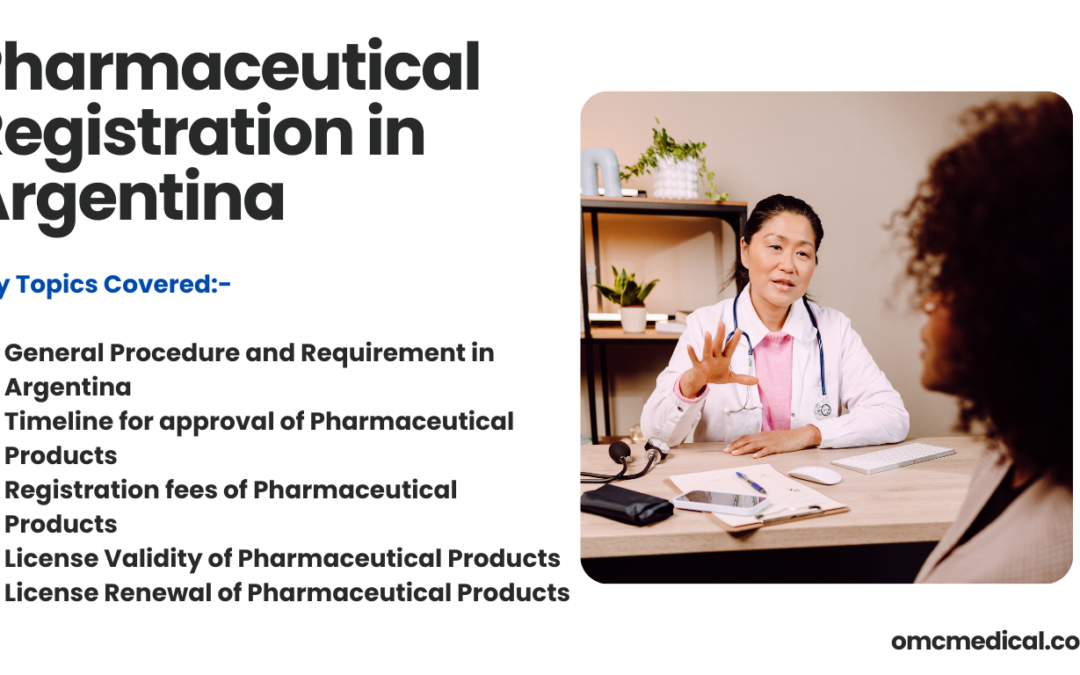
by OMC Medical | Jan 16, 2024 | Registration
MoH: Ministry of Health of Argentina
MoH website: https://www.argentina.gob.ar/salud
Regulatory Authority: The National Administration of Drugs, Food and Medical Technology
Link for Regulatory Authority: https://www.argentina.gob.ar/anmat
Applicable Regulation: DECREE NO. 150/1992 ESTABLISHES THE RULES FOR THE REGISTRATION, PREPARATION, DIVISION, PRESCRIPTION, SALE, MARKETING, EXPORT AND IMPORT OF MEDICINES.
Biologics/Drugs/Pharmaceutical/Medicine/OTC- general registration procedure and requirement in Argentina
Before pharmaceuticals are made available to the public in Argentina, they must undergo a comprehensive product registration process with ANMAT. To complete this process, you must provide extensive documentation outlining the product’s composition, manufacturing processes, quality control methods, and clinical data proving its efficacy and safety.
1. Submission of Documents
This is the first stage in the registration process for medications; the documents contain comprehensive information on pharmaceutical items.
List of product documents for submission-
1. Application form provided by ANMAT.
2. Manufacturing and quality control information.
3. Product composition report.
4. Stability data of the product.
5. Preclinical and clinical data.
6. Pharmaceutical packaging and labelling.
7. Pharmacovigilance plan.
8. Import and export licenses.
2. Evaluation and Assessment
ANMAT reviews the submitted documentation to determine if the pharmaceutical product meets regulatory criteria.
3. Regulatory discussion
The pharmaceutical product is approved and ANMAT issues a registration number when it satisfies all requirements. This number shows that the product has passed the required regulatory criteria and has undergone a comprehensive review.
4. Post-Market Surveillance
ANMAT determines the product’s registration based on the evaluation. ANMAT uses post-market surveillance to keep an eye on the product’s efficacy and safety even after it has been registered and placed on the market.
5. Labelling
Should be in Spanish
Timeline for approval of Pharmaceutical Products
12 to 18 months for small molecules and 24 months for vaccines and biologicals.
Registration fees of Pharmaceutical Products
10.000 ARS (Argentine pesos). These fees vary depending on the type of product to be. The fees are updated every year by ANMAT.
License validity of Pharmaceutical Products
5 Years.
License renewal of Pharmaceutical Products
30 days prior to the certificate expiration date and should include the following documents:
1. Written request.
2. Sworn statement – marketed/non-marketed status.
3. Evidence of marketing.
4. Certified copy of the original certificate.
5. Copy of last approved labelling texts.





